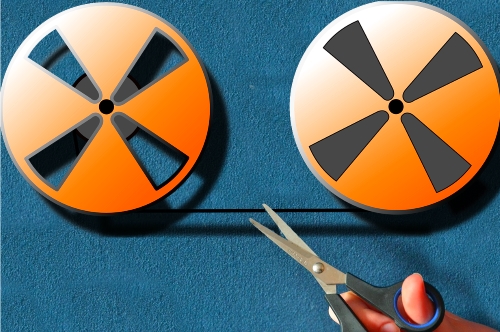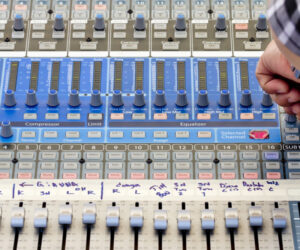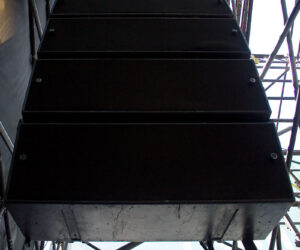
This article is provided by Home Studio Corner.
Once everything has been recorded, and before you start mixing, do you edit the audio? Do you fix things? Do you think it’s cheating?
Here’s my take.
What Is Editing?
An audio editor is much like a book editor. He takes the original audio file and adds or removes bits and pieces to make it better. An audio editor at a radio station will take a spoken-word commercial that’s 34 seconds long and trim it down until it fits into a 30-second spot. A book editor will read the manuscript and suggest that certain parts be taken out…or certain parts be stretched out.
With regard to music production and recording, editing involves any changes made to the audio between the recording phase and the mixing phase. This can involve normalizing audio files, correcting timing issues, removing unwanted sections, or even changing the actual performance itself.
Editing is not just a digital thing. Back in the “analog days,” engineers would regularly cut and splice tape between two different takes.
Is It Cheating?
One could argue that the musician’s performance should remain untouched. If the performance wasn’t perfect, that’s okay. That’s reality. That’s how the musician really sounds.
Others like to take a good performance and “touch it up” here and there to make it even better. A prime example? AutoTune. Some people rant and rave against AutoTune. They write things in the liner notes like “AutoTune was not used anywhere on the album.” Others swear by AutoTune.
First, let me make a point here. You should be recording good musicians. No amount of editing tools or software or magic voodoo will make a crappy musician sound good. Let’s just assume we’re talking about good musicians and good performances.
So…is it cheating to take a good performance and try to improve it? Is it wrong to “pocket” the drums so they’re a bit tighter and more in sync with the click track? Is it wrong to pocket the bass, making it “lock in” with the kick drum? Guitars? Keys? Background vocals?
I can’t tell you if it’s cheating or not. But let me give you my views on this.
I’m Creating A Product
When I’m working on a recording project, the end result (most likely) is a finished CD or album. I’m producing something that’s going to have my name on it. I want it to sound as good as possible. That’s why I work with good musicians.
However, what if there are mistakes in the audio? What if the bass comes in a little too soon in a few spots? Well, I ask myself, what would be best for the song? Would it sound better if the bass was playing with the kick drum rather than a few milliseconds before?
My answer? Yes.
What’s best for the song? That’s what I ask myself. What will make this product I’m creating sound its best?
In my opinion, all these editing tools are just that…tools. Just like in any other industry, I use the tools I have at my disposal to make the best product I can. That means I almost always pocket the drums, then the bass, then the guitars and other rhythm instruments.
Even an amazing performance can stand a little tweaking here and there. I’m not talking about changing the performance entirely. I’m simply trying to enhance the performance. Chances are every change I make is exactly what the musician was trying to do, but didn’t.
At a live show, the band can be really tight, and it sounds great. On a recording however, the little sloppy parts are much more noticeable…so I fix them.
So…like I said, I’m creating a product. I’d much rather listen to a song that sounds amazing and doesn’t have any distracting parts. It doesn’t have to be perfect, and you should never overdo any editing. You’re simply allowing the song to be the focus, rather than the individual components. Again…it’s all about the song.
Next I’ll present some scenarios where it makes sense to edit tracks, followed by some scenarios where it doesn’t.
Where It Makes Sense…
1. Fix Noticeable Timing Issues. This is probably the most obvious reason to edit, but it’s worth mentioning again. There will come times when you’re recording (either yourself or someone else) where there will be those trouble spots, places where the guitar just got really out of time with the drums, or the bass came in a half-second early.
These things happen. Sometimes you miss them during tracking. Sometimes this is just the best your going to get out of the musician. (Let’s be honest, sometimes we don’t have the luxury of recording A-list musicians.)
In these cases, the timing issues are obvious, and most people are going to notice them. It’s in your best interest to fix them. It shouldn’t take long. These types of timing issues can usually be fixed with just a minute or two of editing without negatively affecting the quality of the audio.
2. Tighten Up A Good Performance. Once you’ve fixed the major timing issues, is there any room for more pocketing? Or lets say you are recording extremely talented musicians, is it still possible that you’ll want to pocket those tracks as well? A lot of times the answer is yes.
Whether you agree with it or not, a lot of musicians and their fans are expecting a very polished, tight recording. Even if the musicians nail their parts in tracking, there may be small, subtle timing difference between the various instruments.
While the tracks may sound fine without any editing, a few hours of pocketing can push them over the top in terms of tightness and a (perceived) “professional” sound.
Don’t believe me? Nearly every professionally-produced album that comes out of Nashville (particularly in the country music industry) has gone through this pocketing process. These session musicians are insanely talented, but their tracks still get pocketed. At the very least, it’s something to think about.
3. Get Rid of Unwanted Noise. It’s very possible to produce a recording out of your home studio that sounds like it was done in a professional facility. One of the tell-tale signs of an “unprofessional” home recording is the unnecessary noises that somehow don’t get removed somewhere along the way.
Things like lip noise from the vocalist, the sound of the musicians moving around between sections of the song, pops and clicks in the audio from edits without crossfades, can distract the listener and make them question the quality of the recording.
You may not think this is an issue, but those little noises get amplified quite heavily once you compress and master your final mix. Suddenly a little annoying noise becomes a lot more noticeable…and therefore distracting.
Where It Doesn’t Make Sense…
1. The Artist Doesn’t Approve. Everything you do in the studio should be done with the artist/client in mind. Whether he/she is paying you or not, you’ve been hired to take their songs and turn them into great-sounding recordings.
Sometimes artists don’t want you to mess with their performances. They have strong opinions that they want the final recording to sound exactly like what they performed. This is understandable, and you should respect their wishes.
However, take into account what genre of music they’re performing. If it’s a straight-forward country album, you may want to remind them that most country albums have been edited/pocketed pretty heavily, and that it might be in their best interest to do the same in order to compete.
On the other hand, if you’re recording somebody like Jack White who doesn’t really conform to any genre or style, you’re better off leaving his stuff alone. That rough, seemingly disorganized sound IS what he’s going for.
As with most things, it all boils down to good communication. Do what’s best for the client.
2. The Song Sounds Amazing As Is. Sometimes things just magically gel in the studio, and the tracks sound absolutely fantastic. Even fantastic tracks can sometimes benefit from a little editing, but if you listen through the entire song and don’t hear any spots where things could be tighter, good for you! You can skip editing and go straight for mixing.
It might be a good idea to try editing a small section of the song just to be sure, but if your editing is hurting rather than helping, forget about it.
3. The Song Isn’t Finished. I’ve seen so many people jump in and start editing recorded parts before they’ve recorded everything. For example, they’ll heavily pocket the drums and bass before the guitars have been recorded. This can be a big waste of time for two reasons:
A) Without all the instruments, you can’t really hear the “groove.” If you can’t hear the groove, then you probably can’t hear exactly where and how to pocket the bass and drums. Wait until the guitars, etc., are recorded, THEN determine if pocketing is necessary.
B) Once everything’s recorded, you may not NEED to pocket anything. This happened to me recently. I recorded acoustic guitar and drums, and it wasn’t super tight, but I went ahead and recorded all the other parts, keyboards, bass, lots of guitars. Once the mix was really full, those subtle timing issues between the acoustic guitar and drums were masked by all the other instruments. I didn’t need to do much editing at all.















